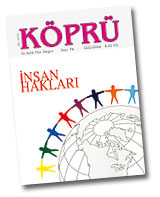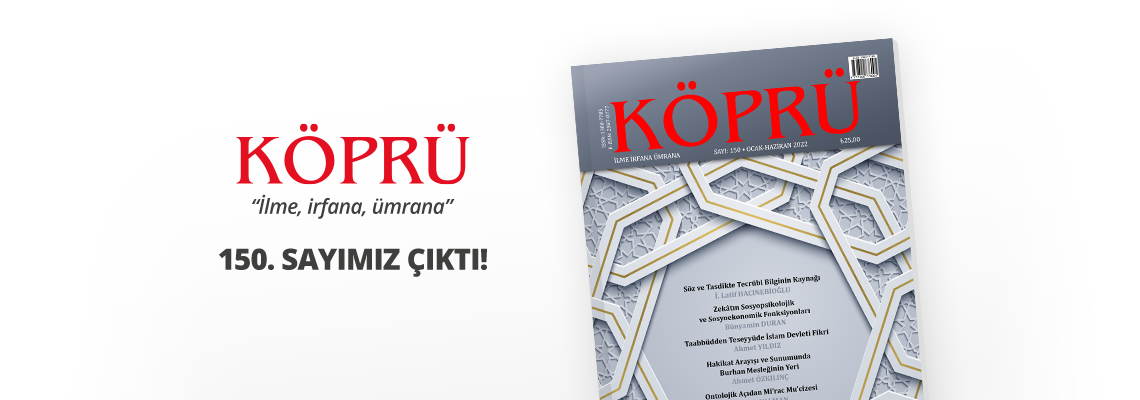Köprü Anasayfa

İnsan Hakları
"Güz 2006" 96. Sayı
-
Human Rights
Editorial
Human being is the most perfect fruit of the tree of creation which possesses all of the rights granted by the Exalted God to every member of the human family without any exception equally and justly. It is very important for the sake of the honor of humanity that the human being should have struggled and are even struggling for these rights which are a natural result of creation. The concept of human rights is worth to investigate as it expresses the superiority of the right, truth, goodness and virtue against the dominant physical power.
In the framework of the human rights doctrine, human being is perceived as an independent being from time and place he lives in and recognized as the holder of those rights which we can define as "the general term for the rights which are recognized for men due to his/her humanity regardless of his/her language, religion, race, gender, nationality, social status and color." Law presumes fundamental rights for human being after his/her birth. These rights belong to each of us and are inalienable rights. Men possess those rights from his birth on due to his nature. In spite of this fact, the idea of human rights has been contrasting to the current beliefs, systems of law and political power and can not be reconciled with those often. This position should be clarified.
Convention for the Protection of Human Rights and Fundamental Freedoms has given clearly defined principles which come into our agenda due to the violation and ignorance of those principles like: "right for life, right against the torture, non-human treatment or punishment, right against involuntary work, right for being tried in front of a just and impartial court in a reasonable time, principle for the impossibility of the definition of a crime without law, principle of innocence of a person until his crime will be proven, freedom of thought and religion, right for the freedom of expression, etc…" The reasons for the violations of those principles should be studied and answered clearly.
Humanity is looking for the fifth cycle of the humane cycles, which has been classified by Bediüzzaman in terms of "humanity has five cycles". This epoch, which is according to the words of Bediüzzaman, "an epoch of ownership and liberty" will enable people to enjoy rights and freedoms and taking steps for this aim. In this issue, he gives some hints of a more liberal world with his views bringing reason, virtue, justice and law in the foreground.
Considering all of the above mentioned issue, we determined the dossier titel of our 96th issus as "Human Rights". We try to study this subject around the concepts of "human rights, human being, right, law, justice, oppression, equality, freedom, public, ethics, conscience, virtue, zımmis, politics, and state" and looked for answers to following questions:
What are "human rights" and where does the effectiveness of this concept stem from? What is the originating point of this concept? What is the significance of the honor of man for the sake of human rights? How can we analyze the concept of human rights from the point of view of natural law/divine law? How should it be protected? What is the role of the principle of rule of law in the protection of human rights? How can we assess the views of Bediüzzaman from the framework of human rights? What kind of a relationship could be established between democracy and human rights? What kind of a connection does exist between justice and human rights? How can we interpret the stress of the dominion of justice over all the levels of private and social life? What kind of reason can we detect behind the contrast of the idea of human rights to the common beliefs, systems of law and political power? What are the role of reason and conscience in the implementation of human rights? What are the contributions of religious beliefs in this issue? How do we need to comment the freedom of religion and conscience from the human rights dimension? What kind of emphasis does Islam attach to human rights? How was the issue of human rights discussed in Qur'an? How can we compare the various conventions of human rights constituted in Western societies with Farewell Speech of Prophet? What is the correlation between freedom and human rights? How can we make a comparison between the conception of liberty in the Universal Convention of Human Rights as 'being capable of performing everything which don't disturb somebody else' with the Bediüzzaman's conception of freedom?
***
We hope to meet you again in our next issue with the dossier subject of 'conservatism' while introducing you to our journal.
-
İnsan Hakları
Editör
Yazıyı okumak için tıklayınız... -
Human Rights
Editorial
Yazıyı okumak için tıklayınız... -
İnsan Hakları
Ali KÖSE
Yazıyı okumak için tıklayınız... -
İslâm Hukukuna Göre Hakkın Menşei
Ali BAKKAL
Yazıyı okumak için tıklayınız... -
Hak ve Ödevin Muhatabı İnsan
Hayreddin KARAMAN
Yazıyı okumak için tıklayınız... -
İsmet Âdemiyyetledir: İnsan Haklarına Fıkhi Bakışlar
Recep ŞENTÜRK
Yazıyı okumak için tıklayınız... -
İnsan Haklarının "Muharriri" Kim?
Ahmet DEMİRHAN
Yazıyı okumak için tıklayınız... -
İslam'a Göre İnsan Haklarının Kavramsal Temellerinden Hürriyet
Recep ARDOĞAN
Yazıyı okumak için tıklayınız... -
Avrupa Birliği Yasaları Çerçevesinde İnsan, Ahlak ve Din İlişkisi ya da 'Religio in Europa'
İsmail TAŞPINAR
Yazıyı okumak için tıklayınız... -
"İnsan Hakları, Hukukun Üstünlüğüdür"
Mehmet ALTAN
Yazıyı okumak için tıklayınız... -
Fikir Hürriyeti Bağlamında Meşveretin Prensipleri (Toplumsal İmanın -Taslak- El Kitabı)
Nuri ÇAKIR
Yazıyı okumak için tıklayınız... -
Vicdandan Devlete Uzanan Yolda İnsan Haklarını Aramak
Ahmet DURSUN
Yazıyı okumak için tıklayınız... -
İnsan Hakları
Mustafa ERCAN
Yazıyı okumak için tıklayınız... -
İnsan Hakları Konusunda Batı'nın Sınavı
Musa Kâzım YILMAZ
Yazıyı okumak için tıklayınız... -
Osmanlı Devleti'nde İnsan Hakları
Ziya KAZICI
Yazıyı okumak için tıklayınız... -
İsm-i Hak: Varlığın Tüm Hakikatleri Hak İsminin Şualarıdır
Mustafa Said İŞERİ
Yazıyı okumak için tıklayınız... -
"Bütün kuvvetimle adalet-i tâmme lehinde, zulüm ve tagallübün ve tahakküm ve istibdadın aleyhindeyim."
Bediüzzaman Said NURSİ
Yazıyı okumak için tıklayınız... -
Veda Hutbesi*
Yazıyı okumak için tıklayınız... -
Avrupa Birliği Temel Haklar Bildirgesi*
Yazıyı okumak için tıklayınız... -
Bediüzzaman Said Nursi'nin Birinci Dünya Savaşı'nda Ermeniler ve Ruslarla Çatışmaları ve Esaretine Dair Bazı Vesikalar
Selim SÖNMEZ
Yazıyı okumak için tıklayınız...
